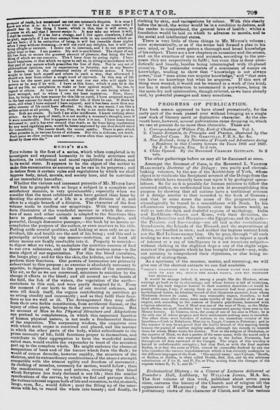PROGRESS OF PUBLICATION.
THE book season appeared to have closed prematurely, for the early part of the week passed over without bringing us a single new work of literary merit or distinctive character. At the ele- venth hour,however, several publications came dropping in, which we can at present do no more than chronicle. These are I. Correspondence of William Pitt, Earl of Chatham. Vol. 1.
°. Counter. Irritation, its Principles and Practice' illustrated by One Hundred Cases. By Dr. Gitasvir.i.r, F. R. S., &c. &c.
3. New Zealand; being a Narrative of Travels and Adventures during a Residence in that Country between the Years 1831 and 1837. By J. S. Pouter:, Esq. In 2 vols.
4. China Opened. By the Reverend CHARLES GUTZLAFF. In 2 vols. The other gatherings before us may all be dismissed at once.
Amongst the foremost of these, is the Reverend L. VERNON HanCOURfs Doctrine of the Deluge; two portly and clerical- looking volumes, by the son of the Archbishop of York, whose object is to vindicate the Scriptural account of the Dcluge from the doubts which have recently been cast upon it by geological specu- lations. So far as it is possible for human patience to follow the reverend author, we understand him to aim at accomplishing this purpose by showing that all nations have a traditional account of a deluge similar to that recorded in the book of Genesis ; and that in some cases the name of the progenitors may etymologically be traced to a resemblance with Noah. In his adventurous enterprise, he travels over the known world, as well as into the dark and doubtful regions of mythology. India and Buddhism—Greece and Rome, with their divinities, in- cluding Deucalion and Hercules—the Egyptians and their gods— the Persians and fire-worship—are all laid under contribution; Scandinavia, the Islands of the Blessed, and the superstitions of Africa, are handled in turn ; and neither the hapless ancient Irish nor the Red Indians escape him. On he goes, through " all such reading as was never read,- without being able to impart a spark of interest or a ray of intelligence to a not incurious subject— without shaking in the slightest degree any of the slight argils ments of the geologists which he has brought forward—nay, with- out seeming to comprehend their objections, or else being in- capable of stating them.
As a specimen of the manner, matter, and reasoning, we will give one of the shortest extracts we can find available.
" NOAH'S GRANDSON PHUT WAS IICDDIIA, WHOSE NA 51P: WAS CHANCED INTO FO AND PO; HENCE TI1E RIVER PAIWS, AND HIS FOOTSIE?' THE SEPEPAD.
It would be strange indeed, if, among a people like the Hindoos, wham writings go back so far in chronology, and whose history is full of traditions, and who pay such singular honour to their remotest ancestors—it would be passing strange, I say, if among them no memorial had been preserved, no mythological notice, no fabulous record of that illustrious ancestor, from whom Ilindostan derives its name. We may reasonably expect, therefore, to find Hind under some other name, some name worthy of the founder of so vast an empire, and, according to the custom of Eastern polytheism, honoured with religious adoration. Now if Hind was one of the sons of Ham as the Mahe. bent affirms, we shall doubtless find him enumerated among those sons in the Mosaic history. In Genesis, then, the name of one of his sons is Plaint; he is the only one of whose progeny and their settlements nothing more is recorded. The other three were founders of nations in the immediate vicinity of the Israelites,—Cush in Babylonia, Mizriiiin in Egypt, Canaan in Palestine; and in like manner it msy be supposed that the fourto branch of this aspiring family became the parent of another mighty nation, although too remote to interest those for whom Moses wrote his history. Now in the religion of Hindustan, or the country of Hind, we find a person of the same name, with the -sound only a little hardened, who was venerated not only in the Indian Peninsula, but throughout all Asia eastward of the Ganges. The origin of this worship is buried in unfathomable antiquity ; but that Bud, or with the final aspirate Budlia, is in fact the same as Phut, cannot be reasonably doubted by any one who considers the various transformations which it has certainly undergone in the different languages of the East. ' Ilis special name,' says Upham, ' or Budhu, or Butlha, is often called Bourn), Hod, But, and by the arbitcavy substitution of F for 13, and P. Po, or Plio, arising from the changes of the cognate letters B, P, T, and D.'"


























 Previous page
Previous page